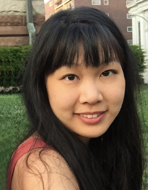Origin Point
In the naturalist’s study each shelf is preserved
as he kept it, a row of bird feathers, fish skeletons,
a severed hand tied at the stump with lace doily
and ribbon, red-spined seashells, skulls of lesser
humans, a hydrocephalic fetus, pinecones,
iridescent beetles, a yellow lump of skin
pushing formaldehyde to the top of the jar.
This is where my father brings my mother
the first day he meets her, when she has missed
her train but he is there, books her a ticket
and they go into the city museums, waiting.
Then it would take eighteen hours into Beijing,
what now takes two, when the bathrooms
in passenger cars were elliptical holes, tracks
flashing below in streaks of gravel and steel.
When I was small enough to fall through, I imagined
that if I slipped into the speckled roaring mouth
and lay still as the metal clicked over, I would follow
not only the railroad bed but also damp lines of urine
like a lost dog. In nightmares then I was afraid
the floor and all the furniture would be both hard
and soft. Ying, the strike of rigor mortis, ran,
the distended belly swollen with gas. In nightmares then
I was afraid nothing I knew would be clean.
What the naturalist knows is still branching.
No floating circle, no dice-cut net, no way of feeling
root from mouth or limb from breathing. His hand
at the center pulls taut each arm: animals from small
to large, furred and unfurred, stocky or slight of contour,
infants limbed and limbless, those with two heads,
those with eyeballs gouged and displayed separately,
those whose mothers survived his grasping and those
who could not pull their children from his shelves.
When she could not afford to have her teeth pulled
in America, my mother goes back to face a cheaper drill.
When she could not afford an ultrasound she waits
until my gender is announced in the delivery room
and my father, surprised, asks how one would know.
We know earlier and later, for science. When I have
my teeth pulled, I am amazed to find each molar
split in two, larger than I’d felt, and I am upset
they were whole only when buried and unseen.
The naturalist hunts for large bones in small pieces
buried in gridded earth. If he finishes the puzzle
correctly, a monster will appear red and dripping.
Many-armed men and two-headed serpents hover
on the margin of old maps, facing that clump-shaped
shore where my mother was born. I draw their house
in that fantastic unknown, until it is named. Until
it slides into glass cabinets, extraordinary and grotesque.
When she first goes to my father’s family, they call
my mother city-slicker, she went home to call them tu.
I would think this meant potatoes, dirt people.
When she brings me, a year old, elbow deep
in caged baby chicks, they envision the sons
her new nation will not have aborted. She is angry,
she then has two. The three of us take a bullet train,
hovering above damp farmland, carrying their gifts,
a sack of peanuts and the largest winter gourd.
When I began to menstruate I believed I could see
with the naked eye my unfilled ovum in some clump
of red whispering water-smoke from the ceramic tunnel
of the toilet. At dinner I pierce the egg sac of a steamed fish
and her tiny pearls spill out, warm and grainy, perfectly round.
I looked for this in me, shredding heavy pads. My family
go to a new exhibit where curators have preserved
only the cloud of veins in a woman. She is so realistic
I think she is made of plastic or crystal. I hope I am too.
I wait under curved glass in a newly built station,
train tracks sprouting gently, blowing softly
the round nose of shining trains. The railroads hold
hands underneath like roots of grass, all crossing point,
twice-traced path, vein and artery and river and river.
Trace the nation again to multiply its fruits. Trace
the body and keep living, air to air, water to water,
four valves of heart, the membranes you pass, food
tubed down to the capital, strong bones on the frontier.
In one cabinet the naturalist hangs a skeleton
of his dear friend, an abomination of excessive height.
The museums have new men to celebrate, new origins
to interpret. Our map still shows both sides. I still search
for that in us, what swells out from that misplaced crossing
of two rail lines, stitching the nation in fishing-line webs.
What dizzy bodies spin out from the pinprick spore
of year and month, organs held together and churning.
What veins revolve between the single sphere of the zygotic egg
and the mesh which surrounds it, tangled and writhing,
almost here, uncollected. Collecting what has sunk below.
 Jessica Yuan has published poems in various publications, including Ninth Letter, The Margins, Ruminate, and Blueshift Journal. She grew up in California and currently lives in Boston, where she is a graduate student studying architecture at Harvard.
Jessica Yuan has published poems in various publications, including Ninth Letter, The Margins, Ruminate, and Blueshift Journal. She grew up in California and currently lives in Boston, where she is a graduate student studying architecture at Harvard.

